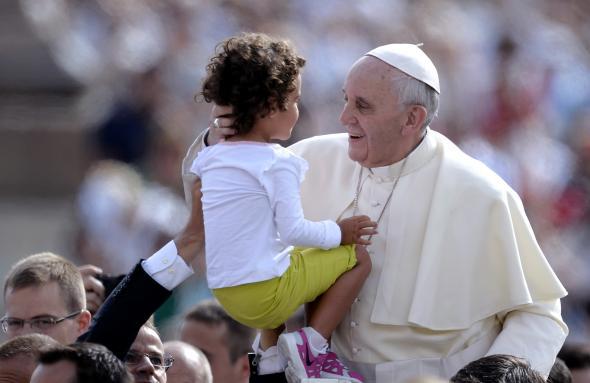This question originally appeared on Quora.
Answer by Eric Stoltz, Roman Catholic deacon and author of the book Ascend: The Catholic Faith for a New Generation:
A few things Pope Francis has done differently than previous popes in his first few months:
He refused to wear ermine-lined capes other popes wore.
Rather than blessing the people in St. Peter’s Square on his election, he asked the people to bless him.
He refuses to ride in a bulletproof Mercedes limousine. He rode on a bus with other cardinals right after his election. He uses a Ford Focus around Rome and drives himself around the Vatican in a 1984 Renault.
He refers to himself as “bishop of Rome” rather than as “supreme pontiff.”
He is the first pope to use the word gay rather than homosexual or “those suffering from same-sex attraction.”
He has stated he intends to transform the Synod of Bishops to a decision-making body rather than a ceremonial rubber stamp.
He refused to live in the Apostolic Palace, instead living in a guest home and dining in the cafeteria.
He has consistently used a more familiar, direct, and casual way of speaking, versus the highly formal and circumlocutory tone used by previous popes.
He has spoken against clericalism, versus other popes who promoted clericalism—e.g., Pope Benedict’s “Year of the Priest.”
He has reached out to atheists.
He sends personal hand-written letters and makes personal phone calls rather than having his secretary send formal messages on his behalf.
He directed the Office of the Synod of Bishops to distribute a questionnaire to Catholic laity to understand their thoughts on marriage, contraception, divorce, and same-sex marriage.
He has called for a reform in how priests are trained, so they don’t become “little monsters.”
He has said he intends to decentralize the Church, de-emphasizing the role of the pope.
He has stated the Church’s priority is service to the poor.
He has reversed the previous pope’s favoritism toward those who insist on Latin and old-fashioned liturgical approaches.
He has said the hierarchy should speak less about contraception, abortion, and same-sex marriage, versus previous popes who specifically stated these were priorities for the Church.
He gives interviews to media outlets.
He has washed the feet of laity (including prisoners, women, and Muslims) on Holy Thursday, versus previous popes who would only wash the feet of priests. This is important because his act directly violates liturgical rules that state that only men may have their feet washed on Holy Thursday (a rule many priests and deacons also ignore worldwide).
He says daily Mass in a public place, for janitors and secretaries and security guards, versus other popes who only invited wealthy and influential people to daily Mass in their private chapel.
He has given a new profile to the post of the Papal Almoner (the person responsible for helping the poor in Rome) and has initiated new programs of gifts and other assistance to the homeless in Rome. He invited Roman homeless people to his birthday breakfast.
He has instructed the curia and the nuncios (ambassadors) to nominate as bishops men who are merciful and pastoral, versus previous popes who directed that bishops be chosen for their doctrinal loyalty and willingness to pick public fights.
He has announced he intends radical reform of the Vatican.
He was named “Person of the Year” by The Advocate, the U.S. national gay and lesbian news magazine.
In the first public document he wrote himself, Evangelii Gaudium, he cited as teaching authorities not just popes and councils, but national episcopal conferences, which no pope has done in the past. He has stated that national episcopal councils should be free to make doctrinal statements, while previous popes have sought to diminish the role of national episcopal conferences.
He attracted in his first eight months three times the number of people who would annually come to see Benedict XVI.
He enjoys an unprecedented 95 percent approval rating among Catholics in the United States.
So that’s the first 10 months. Let’s see what happens in the coming months and, God willing, years. Many priests I know have said this is the first time they have been hopeful for the Church in 35 years, and I concur!
More questions on Catholicism:
